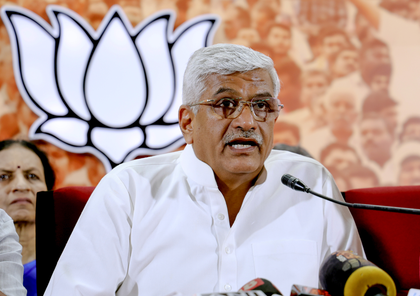Union Minister questions Keeladi excavation findings, seeks more scientific validation
By IANS | Updated: June 10, 2025 16:48 IST2025-06-10T16:43:19+5:302025-06-10T16:48:22+5:30
Chennai, June 10 Union Minister for Culture and Tourism Gajendra Singh Shekhawat on Tuesday raised concerns over the ...

Union Minister questions Keeladi excavation findings, seeks more scientific validation
Chennai, June 10 Union Minister for Culture and Tourism Gajendra Singh Shekhawat on Tuesday raised concerns over the authenticity of the archaeological findings from the Keeladi excavation site in Tamil Nadu, calling for further scientific validation of the reports submitted to the ASI.
Speaking to reporters in Chennai, Shekhawat stated that the reports prepared by archaeologist Dr Amarnath Ramakrishna, who led two crucial phases of the Keeladi excavation in Sivaganga district, lacked sufficient technical backing.
“The reports are not yet technically well supported or established. A lot remains to be done before recognising or accrediting the findings presented by the archaeologist who conducted the survey,” he said. “Let them come with more results, data, and evidence, because a single finding cannot change the entire discourse.”
The Union Minister also voiced concern over what he described as attempts to politicise archaeological discoveries. “People holding such positions are trying to use that to grow regional sentiments. That is not fair. We have to be very cautious. Let archaeologists, historians, and technical experts discuss this, instead of politicians,” he added.
The comments come amid an ongoing controversy between the Archaeological Survey of India (ASI) and Dr Ramakrishna over the latter’s final excavation report.
Though the archaeologist submitted his findings to the Director General of ASI on January 30, 2023, the ASI had returned the report, requesting corrections to improve its authenticity and clarity before considering it for publication.
Dr Ramakrishna, however, refused to revise the report, defending the integrity of his research. In his written response, he maintained that further examination of the excavation sequence would not alter the well-reasoned and conclusive findings of the Keeladi site.
The ASI’s decision to withhold publication of the report has drawn sharp criticism from various quarters, with accusations that the agency is deliberately stalling the release due to political considerations.
Critics have alleged that the ASI is “not interested” in publishing a report that could challenge established historical narratives.
Responding to the backlash, the ASI dismissed the allegations as baseless and said such claims were “a figment of imagination”. In an official statement, it reiterated that the request for revision was made solely to enhance the scientific quality and credibility of the report, not to suppress any findings.
Keeladi’s excavations report claimed that an urban civilisation existed in Tamil Nadu in the Sangam age on the banks of the Vaigai river. The unearthed artefacts belong to a period between the sixth century BCE and the first century BCE. These findings pushed the Sangam age to 800 BCE.
Disclaimer: This post has been auto-published from an agency feed without any modifications to the text and has not been reviewed by an editor
Open in app